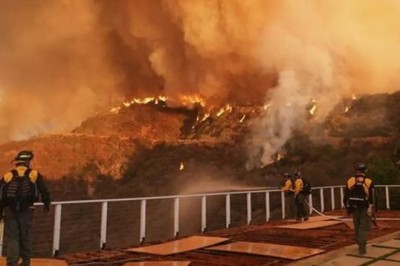views
The WHO has announced that Covid-19 is no longer considered a "public health emergency of international concern."
After three years since declaring the highest level of alert over the virus, the WHO's recent announcement that Covid-19 is no longer a "public health emergency of international concern" represents a significant milestone and a major step towards ending the pandemic, highlighting the progress made in the global effort to control the spread of the virus.
According to officials, the death rate attributed to Covid-19 has significantly decreased from its peak of over 100,000 fatalities per week in January 2021, with the number dropping to just over 3,500 on 24 April, underscoring the impact of vaccination efforts and other measures to control the spread of the virus.
During a recent statement, the head of the WHO revealed that the pandemic has claimed the lives of at least seven million people worldwide, underscoring the devastating impact of the virus and the urgent need for continued efforts to control its spread and ensure access to effective treatments and vaccines.

GREAT HOPE
Despite the official estimate of seven million deaths from Covid-19, the head of the WHO, Dr. Tedros Adhanom Ghebreyesus, suggested that the true figure is likely much higher, possibly approaching 20 million deaths, underscoring the severity of the pandemic and the need for continued action to control its spread and mitigate its impact.
In a recent announcement, Dr. Tedros Adhanom Ghebreyesus, the head of the WHO, shared that following the 15th Emergency Committee meeting, he has accepted their recommendation to declare an end to the public health emergency of international concern, stating with optimism that he declares Covid-19 over as a global health emergency.
Dr. Tedros also noted that the decision to declare an end to the public health emergency of international concern was made after a thorough and deliberate consideration of available data, emphasizing the importance of evidence-based decision making in the global response to the Covid-19 pandemic.
While acknowledging the progress made in the global fight against Covid-19, Dr. Tedros also cautioned that the removal of the highest level of alert did not signal an end to the pandemic and emphasized that the emergency status could be reinstated if the situation changes, highlighting the need for continued vigilance and collaboration to ensure the ongoing control of the virus.
Urging countries to remain vigilant in the face of the pandemic, Dr. Tedros cautioned against complacency and emphasized that the removal of the highest level of alert should not be used as an excuse to dismantle the systems put in place to control the virus or to downplay the ongoing threat of Covid-19, emphasizing that continued efforts and adherence to public health measures are crucial to ensure the ongoing control of the virus.
In January 2020, recognizing the severity of the Covid-19 outbreak, the World Health Organization declared it to be a public health emergency of international concern (PHEIC), reflecting the urgent need for a coordinated global response to the rapidly spreading virus and the potential threat it posed to public health worldwide.
The declaration of Covid-19 as a public health emergency of international concern in January 2020 served as a critical call to action for the global community, highlighting the urgent need for coordinated efforts to protect individuals and communities from the novel virus and to mitigate the potentially devastating impacts of the pandemic on health systems, economies, and societies worldwide.
With the end of the global health emergency status for Covid-19, individual countries will assume greater responsibility for managing the ongoing pandemic, adapting and implementing measures tailored to their unique circumstances and risk profiles, while also remaining mindful of the global nature of the pandemic and the need for continued collaboration and information-sharing across borders to ensure the most effective response to the virus.
- Chinese scientists publish long-awaited Covid data
- US to end Covid vaccine air travel requirements
- Covid whistleblower returns home to Wuhan after jail
The development and deployment of vaccines represented a major turning point in the global fight against Covid-19, with over 13 billion doses administered to date, providing millions of people with protection against serious illness, hospitalization, and death, and enabling countries to begin to shift their focus from crisis response to long-term pandemic management and recovery efforts.
Despite the significant progress made in vaccine development and deployment, many countries continue to struggle with limited access to vaccines, leaving large segments of their populations vulnerable to Covid-19 and its potentially devastating health and socioeconomic impacts, highlighting the ongoing need for global cooperation and equitable distribution of vaccines.
Since the beginning of the pandemic, there have been over 765 million confirmed cases of Covid-19 reported globally, with the virus continuing to spread in many parts of the world and the emergence of new variants underscoring the need for continued vigilance and robust public health measures to control transmission and prevent further outbreaks.
As vaccination rates have increased in some countries, including the US and UK, policymakers have begun to shift their focus from emergency response to long-term pandemic management, with many considering strategies for "living with the virus" that balance the need to control transmission with the social and economic costs of ongoing restrictions, although concerns remain about the potential for new variants to emerge and the ongoing impact of the pandemic on vulnerable populations.
Despite the decision to remove Covid-19 from the list of public health emergencies of international concern, Dr Mike Ryan, executive director of the WHO's health emergencies programme, stressed that the ongoing threat posed by the virus cannot be underestimated, and that continued vigilance, robust surveillance, and effective public health measures will be essential to controlling its spread and minimizing its impact.
Dr Mike Ryan, executive director of the WHO's health emergencies programme, cautioned that while the end of the public health emergency status does not mean the end of Covid-19, it does mark a new phase in the pandemic, with ongoing transmission likely to persist and necessitating continued efforts to monitor and control the virus through measures such as widespread testing, contact tracing, and vaccination campaigns.
Dr Mike Ryan explained that pandemics often have a long tail, citing the example of the 1918 pandemic virus that took decades to fully disappear.
Dr Mike Ryan highlighted that pandemics historically continue to transmit for a long time and often only end with the emergence of the next pandemic, emphasizing the need for ongoing vigilance and preparedness for future outbreaks.




















Comments
0 comment